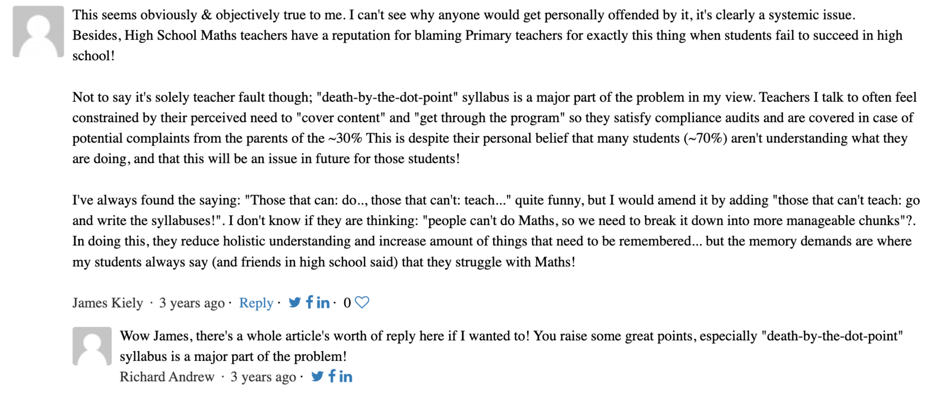70% Of Capable Students Are Failing Mathematics. What Can We do?
|
OK, so the title is a tad sensationalistic. My use of the term 'failing' refers to students not coping with (being confused by, feeling disempowered with, not understanding) mathematics that they are capable of mastering. Although I cannot prove the validity of the title, I have more than a vague hunch that a heck of a lot - perhaps 70-ish% - of students are (significantly) under-performing in mathematics, mathematics that they could be mastering.
What countries, I hear you ask? We can probably assume this applies to school students of most western countries. Now, I can already feel the hackles rising on some readers. So, for the record, I'm not criticising teachers. Heck, how challenging is the plight of the mathematics teacher? (And I was one for 20+ years and for a fair chunk of those, a part of the problem.) Yet - if what I'm saying here is even remotely close to reality, then, maybe, something is a tad broken. Which means we have to ask the question, 'Is there a better way? The approach I've taken in this article ...
First, I’ll argue - in a rather (very?) unique manner - that 70-ish% of school students are performing at a level that is congruent with their belief ‘I’m hopeless at mathematics’.
Second, I’ll draw on some research that allows us to conclude that most of this 70% of students are capable of succeeding at the very mathematics they are struggling with. |
The unintentional ‘How did you fare with school mathematics?’ survey.
For four decades, once people discovered I was a mathematics teacher, they would commonly unload their school mathematics experience onto me. This is despite me never asking them to do so!
Poignantly, the most common response was along the lines I was hopeless at mathematics.
At least a hundred people must have summarised for me their school math experience, and at least 70% have been of the type I bombed at mathematics.
Granted, this is far from solid research. Nor is the sample space large. Nevertheless, when I share this anecdote with other maths teachers, they almost universally agree that of the many people who also share - uninvited - their maths experience with them, 70-ish% state they never understood maths at school … they hated maths … they bombed at maths.
Poignantly, the most common response was along the lines I was hopeless at mathematics.
At least a hundred people must have summarised for me their school math experience, and at least 70% have been of the type I bombed at mathematics.
Granted, this is far from solid research. Nor is the sample space large. Nevertheless, when I share this anecdote with other maths teachers, they almost universally agree that of the many people who also share - uninvited - their maths experience with them, 70-ish% state they never understood maths at school … they hated maths … they bombed at maths.
But does this mean that all 70% failed?
In case anyone is suggesting ‘Just because an adult says they were hopeless at school maths doesn’t mean they failed’, let me state the following for the record:
- Generally, people are good judges of whether or not they succeeded in a subject at school, especially mathematics.
- The other 30-ish% of people - who said they were GOOD at maths - were equally eager to share their experience.
- I find it implausible that someone would claim to have been hopeless at school maths when, in reality, they performed well.
My conclusion, therefore, is that a majority of people fared poorly with mathematics they were capable of mastering when they were at school.
What types of maths?
The very pertinent question is - What types of mathematics did this majority of responders struggle with? Was it with Yr 12 topics such as locus, matrices, imaginary numbers and integral calculus?
No! Clearly, those who claim to have bombed out never made it to the higher levels of school mathematics. Rather, they failed to cope with simple topics such as fractions, decimals, percentages, basic algebra, Pythagoras, indices, right-angled trigonometry and pretty much anything with a formula.
In other words, we are talking about junior high mathematics! And when we break junior high maths into concepts, we discover that none of it is difficult! Nevertheless, it seems that, arguably, 70-ish% of people found their junior high school mathematics to be a perplexing experience.
No! Clearly, those who claim to have bombed out never made it to the higher levels of school mathematics. Rather, they failed to cope with simple topics such as fractions, decimals, percentages, basic algebra, Pythagoras, indices, right-angled trigonometry and pretty much anything with a formula.
In other words, we are talking about junior high mathematics! And when we break junior high maths into concepts, we discover that none of it is difficult! Nevertheless, it seems that, arguably, 70-ish% of people found their junior high school mathematics to be a perplexing experience.
Houston, we have a problem!
|
Spoiler Alert: A rather significant assumptive leap coming!
I see every reason why our 70-ish% figure of adults who bombed at school maths - in the past - would, in some way, correlate to current high school students. I see no reason to suggest that students' responses to school mathematics have radically changed over recent decades. In other words, I'm proposing that a majority - perhaps 70-ish% - of current high school students struggle with junior high mathematics. (Note: Even if the figure was closer to 40%, it would still be a major problem.) |
It must be stated that all this is despite the extraordinary efforts of hard-working, determined mathematics teachers who are genuinely doing their best to make a difference in their classrooms.
My teaching experience - which has been somewhat unique - backs up this hunch. Sure, I was the teacher for 50+ maths classes and had some 100 others under my care as a Department Head. However, a more poignant window into what is going on for students in mathematics lessons comes from casual (substitute) teaching.
Early in my professional career, I spent a decade being nomadic. This resulted in me spending one or more lessons inside some 200 maths classrooms across South Australia, the Northern Territory and New South Wales. An eye-opening experience, to say the least! And my experience is absolutely in line with the hunch that 70-ish% of students are not coping with junior mathematics.
Again, this is far from solid research. Regardless, it's a ponder-worthy hunch.
My teaching experience - which has been somewhat unique - backs up this hunch. Sure, I was the teacher for 50+ maths classes and had some 100 others under my care as a Department Head. However, a more poignant window into what is going on for students in mathematics lessons comes from casual (substitute) teaching.
Early in my professional career, I spent a decade being nomadic. This resulted in me spending one or more lessons inside some 200 maths classrooms across South Australia, the Northern Territory and New South Wales. An eye-opening experience, to say the least! And my experience is absolutely in line with the hunch that 70-ish% of students are not coping with junior mathematics.
Again, this is far from solid research. Regardless, it's a ponder-worthy hunch.
But all people are capable of K-12 maths - What the ?!?
And yet, cognitive scientist Daniel T Willingham states in his article Is It True That Some People Can't Do Math?, that the vast majority of people are fully capable of learning K-12 mathematics (Willingham, 2010, p. 1).
My reading of the article is that even though Willingham references K-12 mathematics, he is, in fact, referring to junior mathematics. Quote: Virtually everyone is fully capable of learning the numeracy content and skills required for good citizenship: an understanding of arithmetic procedures, algebra, geometry, and probability deep enough to allow application to problems in our daily lives.
His statement is rigorously argued and backed up by research.
My reading of the article is that even though Willingham references K-12 mathematics, he is, in fact, referring to junior mathematics. Quote: Virtually everyone is fully capable of learning the numeracy content and skills required for good citizenship: an understanding of arithmetic procedures, algebra, geometry, and probability deep enough to allow application to problems in our daily lives.
His statement is rigorously argued and backed up by research.
Where we are up to in this article
The first part of the title (70% of students are failing at mathematics they are capable of mastering) ...
I have argued, albeit, in an unusual way, that 70-ish% of students are likely under-performing at mathematics. And by inference, Willingham provides the research to state that most of these 70-ish% are fully capable of the mathematics they struggle with and fail at, namely, junior high maths - fractions, decimals, percentages, measurement ... pretty much anything with a formula!
The second part of the title … (What can we do?) ...
We have established that there is a problem. The question is, what can we do about it.
But first, to handle the obvious objections ...
But first, to handle the obvious objections ...
This is outrageous. You're pulling numbers from thin air. It's not research
I get it - this is far from a research-backed article. This is simply a 'let's have a ponder' article.
But, for those who are vehemently disagreeing, by inference, you are claiming that the percent of students who are significantly under-performing is much less than 70%.
So let's pick a number - How about 40-ish% of students are under-performing?
If 40% is your figure, then this means you believe 60-ish% of students genuinely understand and are fluent with fractions, decimals, percentages, integers, Pythagoras, trigonometry, straight-line graphing, measurement, 3-4 step algebra work and all other forms of junior high mathematics.
It also means that if you were to spend a couple of lessons in each of a thousand western-world mathematics classes, randomly selected, you are confident you will see 60-ish% of students understand and be fluent with the aforementioned junior mathematics topics.
After that little thought experiment, I'll stick with my original figure of 70-ish%.
But, for those who are vehemently disagreeing, by inference, you are claiming that the percent of students who are significantly under-performing is much less than 70%.
So let's pick a number - How about 40-ish% of students are under-performing?
If 40% is your figure, then this means you believe 60-ish% of students genuinely understand and are fluent with fractions, decimals, percentages, integers, Pythagoras, trigonometry, straight-line graphing, measurement, 3-4 step algebra work and all other forms of junior high mathematics.
It also means that if you were to spend a couple of lessons in each of a thousand western-world mathematics classes, randomly selected, you are confident you will see 60-ish% of students understand and be fluent with the aforementioned junior mathematics topics.
After that little thought experiment, I'll stick with my original figure of 70-ish%.
Mathematical Understanding is Key
As I establish in the article, Why Students Need To Understand Mathematical Concepts Before We Teach Them Procedures and in articles on the Understanding-first approach (linked below), the key to having more students perform better in mathematics is - surely - to improve their understanding of the concepts of the mathematics they are exploring.
It shouldn’t take an Einstein to conclude that a major reason for students not coping with mathematics must be a lack of mathematical understanding; specifically, a lack of understanding of the concepts any given piece of work requires students to deal with. And yes, this may have been happening from day one of their school mathematics experience.
As I argue in Why Compartmentalising Is A Bad Idea When Teaching Mathematics, one factor contributing to our 70-ish% of under-achievers is likely an over-compartmentalising of mathematics teaching.
If we are to avoid having WAY too many students spending WAY too much time in WAY too many lessons not understanding the mathematics in front of them, then we need to present mathematics so that students are able to understand, conceptually, what’s going on ... and to understand it before we teach them the related procedures.
It shouldn’t take an Einstein to conclude that a major reason for students not coping with mathematics must be a lack of mathematical understanding; specifically, a lack of understanding of the concepts any given piece of work requires students to deal with. And yes, this may have been happening from day one of their school mathematics experience.
As I argue in Why Compartmentalising Is A Bad Idea When Teaching Mathematics, one factor contributing to our 70-ish% of under-achievers is likely an over-compartmentalising of mathematics teaching.
If we are to avoid having WAY too many students spending WAY too much time in WAY too many lessons not understanding the mathematics in front of them, then we need to present mathematics so that students are able to understand, conceptually, what’s going on ... and to understand it before we teach them the related procedures.
Related Articles
Why Students Need To Understand The Concept Before We Teach Them The Procedure - here
Let's stop forcing our mathematics students to play the memory game! - here
Why We Need An Understanding-first, Procedures-second Mindset When Teaching Mathematics - here
Too Many Kids Hate Maths - here
The Understanding-first, Procedures-second Approach In Action - Three Examples - here
Why Compartmentalising Is A Bad Idea When Teaching Mathematics - here
Could These Four Aspects Of Mathematical Understanding Change The Way We Teach Maths? - here
Call to Action
Are the heckles standing? Yes, this is an against-the-grain article. Yes, it's a bit of a poke at the bear. However, I do believe the conclusions are worth pondering.
I'd love to hear your views ...
NOTE: Create a Hyvor account before commenting (click LOGIN) -that way you'll be notified of replies and you won't be anonymous.
If you don't create an account, please state your name at the start of your comment. Thanks.
I'd love to hear your views ...
NOTE: Create a Hyvor account before commenting (click LOGIN) -that way you'll be notified of replies and you won't be anonymous.
If you don't create an account, please state your name at the start of your comment. Thanks.
A Past Comment






